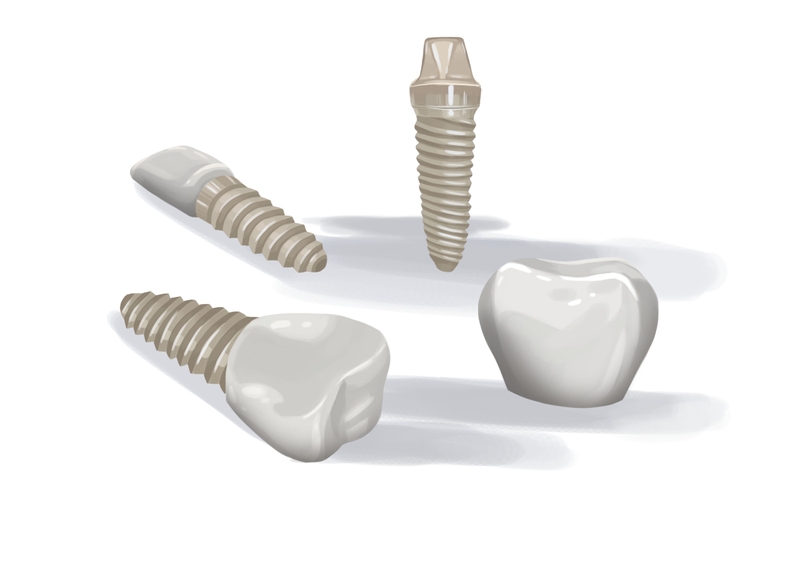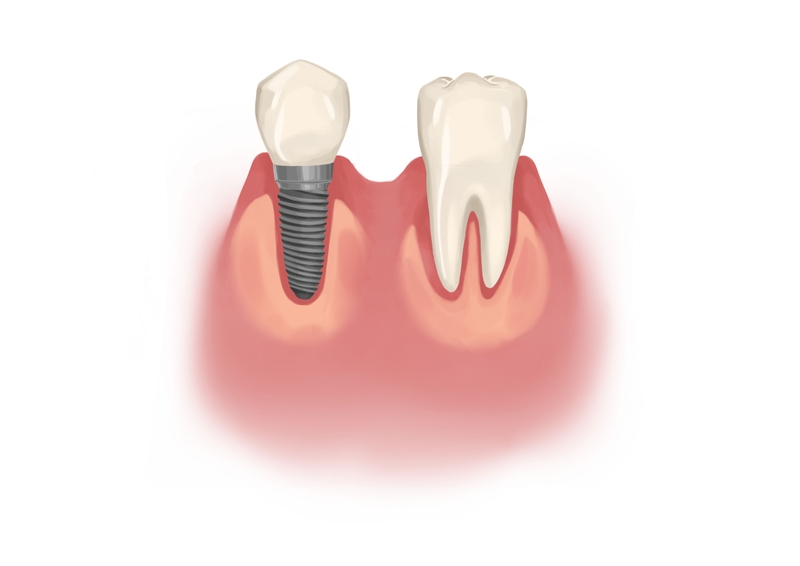- Getting a dental implant is a serious investment, and you should carefully consider which brand to choose. Not all are the same.
- The leading dental implant manufacturers are Straumann, Nobel Biocare, Dentsply Sirona, Zimmer Biomet, Henry Schein/BioHorizons, Hiossen, and MegaGen. Each of them offers products with unique features.
- Some brands offer a wider range of products, while others focus on medical research. Some manufacturers offer highly innovative products, such as bone growth-promoting implants.
A brilliant smile is your key to a happier life. Use Authority Dental to find an affordable dental implant treatment near you. It's easy, fast, and reliable.
Confused about choosing a brand for dental implants? Here's everything you need to know.
Top 7 dental implant brands

Picture by Authority Dental under CC 2.0 license
There are seven companies well-known for excellent dental implants. These seven are in no particular order, and you will be getting a great product no matter which one you choose.
Harry Lee, DMD, stresses: "One of the most frequently asked questions is which implant brand is the 'best', and the truth is that for the major, established companies—like Straumann, Nobel Biocare, and Dentsply Sirona—you are choosing among titans. In my conversations with surgical colleagues, the consensus is not that one brand is universally superior, but that consistency, documented research, and long-term availability of parts are paramount."
Straumann
Straumann is undoubtedly one of the leading dental implant companies and is trusted by many dentists, oral surgeons, periodontists, prosthodontists, and other dental professionals who place implants. The company was established in 1974 and has since sold over 14 million implants worldwide. A recent estimation shows that Straumann holds 24% of the market for implant dentistry.
Straumann does more than dental implants. They also make digital products for scanning and impressions, biomaterials, surgical guides, and implant instruments. They continue to improve their innovative solutions using research and development in their own scientific labs.
Straumann also provides initial and continuing education on implant placement and the use of its own products. They offer courses for dental professionals to enhance their implant skills and educational materials for patients considering an implant restoration.
Nobel Biocare
Nobel Biocare is another leading implant company, holding approximately 35% of the dental implant market share. It boasts 65 years of implant research and development, starting with Per-Ingvar Brånemark's discovery of osseointegration. Nobel Biocare's headquarters are in Zurich, Switzerland, but it has locations in many countries worldwide.
Like Straumann, Nobel Biocare offers a full range of implant products, training, implementation, and patient education materials. They focus their efforts on the manufacturing of dental implants and on products related to implant placement, such as abutments, crowns, and bridges. They have their own software and scanning systems that can be used individually or together to design prosthetics.
Dentsply Sirona
Dentsply Sirona has been around for more than a century. They have a supply of dental equipment and consumables and sell products in over 120 countries worldwide. Dentsply Sirona is the market leader in dental consumables. It produces both laboratory products and dental supplies, including anesthetics and materials used for gum disease prevention.
Dentsply Sirona has an extensive product lineup. They provide technology and products for digital solutions, orthodontics, enabling devices, implants, general healthcare, single-unit crowns, root canal treatment, class II direct restorations, digital lab workflows, and preventive procedures.
Zimmer Biomet
Zimmer Biomet was established in 1927 and first introduced itself in the medical world. They have been a leader in prosthetic technology, including guided robotic surgeries. It accounts for 20% of the worldwide orthopedic medtech market and just under 10% of the dental implant market.
Outside of its contributions to the medical and dental world, Zimmer Biolet dedicates a team to developing sustainable practices - both environmental and social. In 2018, they announced a philanthropic arm of the company, which devotes resources to communities in need.
Henry Schein
Henry Schein completed a 60% equity investment in BioHorizons back in 2013, so you will see either of those two names on this one brand. Henry Schein is the world's largest producer of healthcare products, with lines in the medical, dental, and veterinary fields. They offer a wide range of products in both clinical and office supplies.
BioHorizons was founded in 1994 and is known for producing high-quality dental implants and regenerative products for bone grafting. In just 10 years, they generated $130 million in revenue when Henry Schein stepped in to invest.
Hiossen (Osstem Implant)
Hiossen is one of the top five dental implant suppliers in the world. They specialize in implants, dental equipment, clinical education, and digital dentistry. It has the largest share of the Asian-Pacific dental implant market.
Hiossen has a unique mission. Their focus is on shortening treatment periods by using new techniques that enhance placement accuracy and reduce appointment length and the number of times a patient must return to the office. Hiossen has several lines of dental implants, each with different benefits.
MegaGen Implant
MegaGen implants are used in over 100 countries and have been expanding their market share in recent years. Like the other companies we have discussed, MegaGen offers more than just implants. They have bone regeneration materials, digital scanners and printers, and their own line of extraction instruments.
MegaGen's implants are blue, due to a chemical reaction between calcium and titanium. The blue color sets them apart from other implants and allows for quick quality control. The calcium layer also enhances osseointegration (bone growth) between the implant and bone, thereby decreasing healing time after treatment. The accelerated bone formation is due to calcium attracting other ions, which work together to form an apatite layer and promote rapid mineralization.

What can the dental implant market look like in the future?

Picture by Authority Dental under CC 2.0 license
The dental industry expects the market for dental implants to continue to grow. It is projected to reach $60 billion by 2024, just two short years away. The increase is driven by demand for better oral appliances and rising disposable income worldwide.
Professionals have been doing an outstanding job of spreading dental education to a larger population. Now, more people than ever understand the impact of poor oral care on the rest of their health, so we are seeing an increase in demand for restorative treatment.
Of course, there has also been an uptick in cosmetic dentistry, lifestyle changes, and technological advancements that have been key to pushing the dental implant market to new heights. Dental implant technologies will only continue to grow as science expands the reach of what professionals can accomplish.
In addition, our geriatric population continues to grow, as does their access to insurance companies that cover dental implants. This is in stark contrast to just a few years ago, when dental implants were rarely covered by insurance.
FAQ
How many brands of dental implants are there?
There are more than 150 dental implant brands, but about five are the most trusted and well-known. Still, other lesser-known implant companies exist, and many have quality products.
How to choose between different dental implant systems?
You should consult a dental professional about the dental implant systems available to you. If they prefer a less well-known one, you should spend some time researching the brand's quality to ensure you will not have problems in the future.
What factors, other than dental implant brand, determine the success of implant placement?
Aside from the dental implant brand, the patient and the dental professional have just as much (if not more) impact on the implant's success. Some patients are not good candidates for implants, typically because of their current bone health or overall health. In addition, some dental providers have more skill and more education than others, which can lead to better outcomes. Make sure your dentist reviews your medical history and asks about their success rate in previous cases.
References
- Dental Implant Market Size, Share & Trends Analysis Report By Implants Type (Titanium, Zirconium), By Region (North America, Europe, Asia Pacific, Latin America, MEA), And Segment Forecasts, 2021 - 2028
- Straumann official website
- Nobel Biocare official website
- Dentsply Sirona official website
- Zimmer Biomet official website
- Henry Schein official website
- Hiossen official website
- MegaGen official website
Harry Lee, DMD
I emphasize that an implant is a lifetime investment, and just like buying a car, you want to be sure you can get replacement parts twenty years from now. These global leaders have invested heavily in research, providing clinical data that spans decades. For instance, the original research on osseointegration forms the basis of Nobel Biocare's product line. At the same time, Straumann is known for its extensive range and focus on innovative surface technology designed to enhance bone fusion.